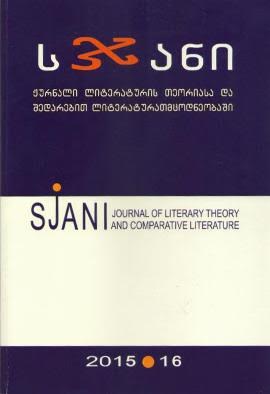რომანტიზმი: ტექსტი და კონტექსტი
Romanticism: Text and Context
Author(s): Gaga LomidzeSubject(s): Literary Texts
Published by: ლიტერატურის ინსტიტუტის გამომცემლობა
Keywords: romanticis; poetry; demonism; original sin; individual sin; potentiality.
Summary/Abstract: The Beginning of Romanticism is associated with the contradictory nature of the universe that implies distinction between imminence and existence, ideal and reality. The ideals suggested by Enlightenment were not realized. That’s why Romanticism worked out apposition implying to condemn reality and turn to the world of ideals. Romantic authors are not trying to solve contradictions in the visible world, but they are fully concluded with in the world of imaginations.Art was the highest form of creativity in Romanticism as well as in Classicism,but Classicism, in contrast to Romanticism, divided everyday life and art. For Romantic authors potential becomes actual. Romantic authors set emotions against mind as well as dreamer protagonist against rational, mature protagonist of Classicist epoch. It was a certain kind of reinterpretation of Kant’s question: what kind of interrelation is between the phenomena and noumena? This is remodeling of the topic that back in the Baroque epoch, in the 17th century became vital: merge of fictive and real. That is why in Romanticism life and art becomes one.The movement had its specific features in different countries, because it was caused by different ideological concepts as well as events of social and political importance.Social background of Romanticism in Europe was the Great French Revolution, while national liberation movements served as a foundation for the movement in Eastern European countries. In the US development of the movement was marked with the sign of self-reliance of the nation. German Romanticism was influenced by Fichte’s idealistic philosophy,while Rousseau’s doctrines had a significant impact on French Romanticism. Georgian Romanticism is a part of this larger context. Its ideological basis is connected to the name of Solomon Dodashvili – Georgian philosopher, journalist, historian, grammarian, who significantly influenced Nikoloz Baratashvili, a major figure in Georgian literature, and who participated in 1832 conspiracy against the Russian hegemony in Georgia. German Idealism, Schelling and Schlegel brothers were his major influence.According to Romantic authors, it is impossible to interpret the world in terms of the things already realized. Thus, they think that every society as well as an individual is more than s/he realizes him/herself in a certain social givenness. For example, in the case of Nikoloz Baratashvili, he was “condemned” to live in a given social environment. He himself understood these limits very well and that’s why (like his counterparts: Byron or Lermontov) his potential possibilities - his shocking character used to emerge on the surface in different circumstances. The repressed nature of an individual comes to the surface and destroys everything on its way. This mechanism works like a Freudian anthropological model. In Baratashvili’s case, for example, in his poem “Mystic voice” we see a concept of “voice of conscience”.This concept offers a key to interpretation of the poem as well as Baratashvili's behavior in real life. “Voice of Conscience” is the same as Superego and reminds of “Elfking”by Goethe, where positions of elfking and father of a child contradict each other like temptation and taboo. From here there are two directions one can follow: one takes us to Castration Anxiety and another – to Superego. When an individual is unable to realize him/herself in a given social environment, the so-called “world-weariness” starts; weariness be cause of the things unrealized in the given environment, because the environment is limited.Romanticism does not give priority to the characters (because it implies something that is already realized, fulfilled). Romanticism prefers lyric poetry instead. Juvenilism is one of its characteristics. It resembles youth, when from the vast possibilities nothing is realized yet.
Journal: სჯანი
- Issue Year: 2015
- Issue No: 16
- Page Range: 26-45
- Page Count: 19
- Language: Georgian

